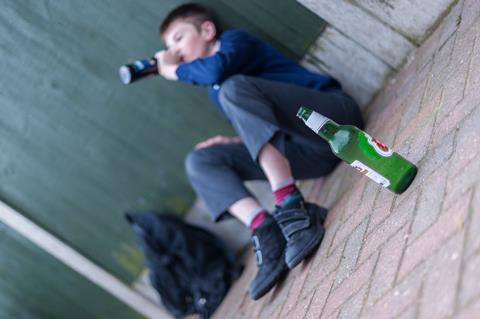Children in England are more likely to have drunk alcohol than those in any other country. Emma Heath says the news should be a wake up call to churches who are contributing to an unhealthy culture around alcohol

England has the worst rate of child alcohol consumption in the world.
That’s according to a new report by the World Health Organisation, which shows more than half of children had drunk alcohol by age 13.
I believe we are living in a culture of denial around the serious impact that alcohol is having. Having lived a life of alcohol abuse myself, I am now running a national Christian charity upskilling teams to work in the area of addiction. But it takes a wake up call to really see what is going on around us, and I had just that jolt when I was invited to speak at a local school in Dorset.
When I met the school headmaster I saw a piercing sadness in his eyes. He asked if I’d go to a class after my talk to speak privately to two young girls about alcohol. I was shocked to discover these girls were aged just 6 and 7, and both of them had been found to be drinking and bringing alcohol into school.
It transpired that the parents of both girls had unhealthy relationships with alcohol, which was trickling into these young girls lives.
A week later I went to a church youth club to speak to a group of 14 year olds. I was taken aback to discover that excessive alcohol was impacting most of their lives, whether through their family or their friends drinking too much.
So here’s the wake up call. It is now normal for our young people to be affected by alcohol abuse. If you meet a young person whose life has not been adversely effected by alcohol, that’s abnormal.
We’ve long lived in a culture which promotes alcohol and drinking to excess as the norm to accompany a “good time out.” In many parts of our society, binge drinking has become normalised, and if you travel internationally, you will sometimes discover we Brits have a reputation. We are notorious for “drowning our sorrows” in the form of a bottle. In a world that is increasingly broken and fragmented, alcohol is also often used behind closed doors to numb emotional pain.
Change is desperately needed.
The Church’s response
Church leaders always say they want to support our weaker brothers and sisters. But in my experience of leading recovery ministries, I’ve seen churches make contradictory choices. For example, there was the church that on the one hand promoted and ran recovery courses, while at the same time holding discipleship courses where the wine would be in full flow, or church weekends away where ‘beer and BBQ’ were heavily promoted as a way of enticing people to sign up.
Too many of us are unaware of the dangers of alcohol. We conform to the societal patter of the world where alcohol is not just accepted but actually promoted - even as part of church life. It’s difficult to see how a church that has a bar on its premises can legitimately claim to want to serve people in the community who are in recovery.
I know Jesus turned water into wine, yet in biblical times, wine was a fraction of the strength it is today and wasn’t used to drink to oblivion.
And so I’m wondering, could the reality that Great Britain has the world’s worst rate of child alcohol consumption be the wake up call we all need?
Writing in The Guardian, Gary Nunn is right to observe, “The issue is less the alcohol itself and more our attitude towards it and the problematic culture we’ve created around it.” All Christians, including church leaders, need to ask hard questions about our individual and corproate relationships to alcohol.
These challenges seem so vast and the resources are so few, but discovering what help is available is the first step. Steps to Active Recovery (STAR) has developed a Discovery Network resource map for Recovery. It is in its infancy, but anyone can recommend locations for their local addiction and recovery support services and they will be added to the map.
STAR is working with some brilliant churches who are embracing recovery ministries. We work with teams of volunteers, offering training to help Christians grow their confidence in this field, while committing to provide them with the resources required to take action.
Together, we can make progress. But it begins by admitting our unhealthy attitudes toward alcohol do not simply exist ‘out there’ in the world, but inside our church cultures too.
What can parents, carers, youth leaders, and the Church do to change the culture of binge drinking? Mary Deller and Ash Porter discussed this on Premier Christian Radio’s Inspirational Breakfast show. Listen now on premier.plus




































No comments yet